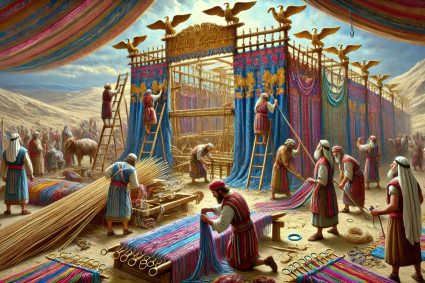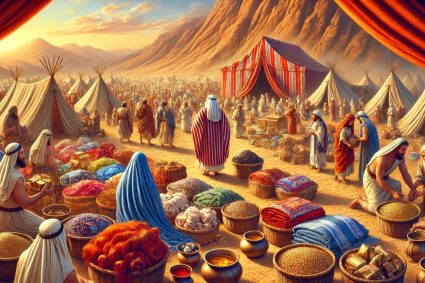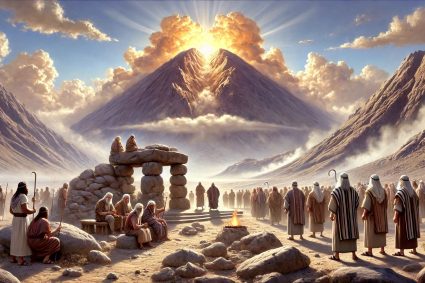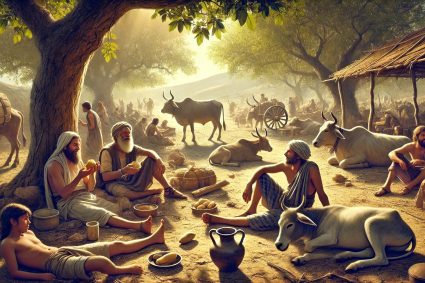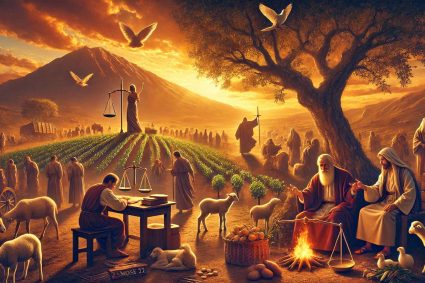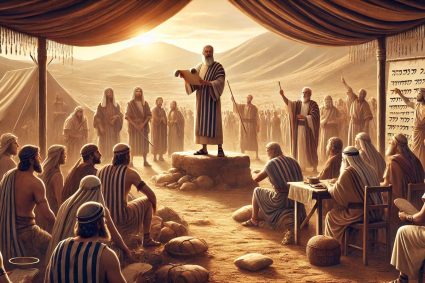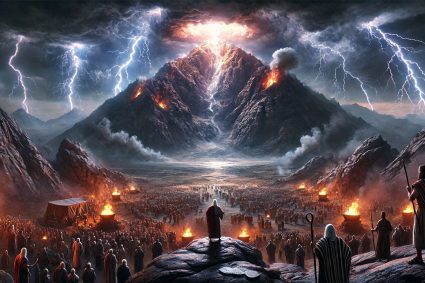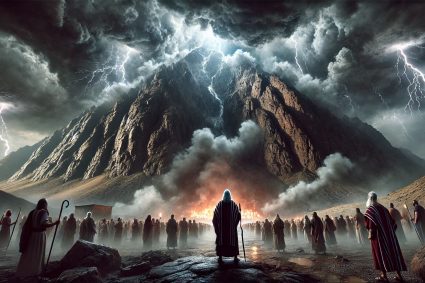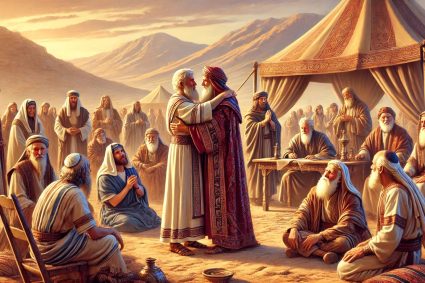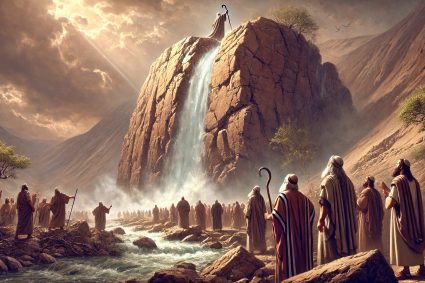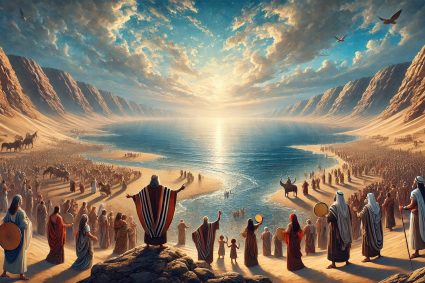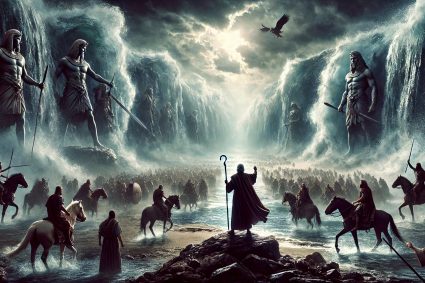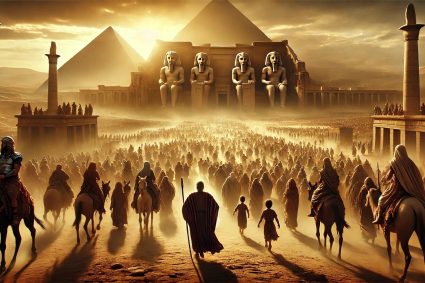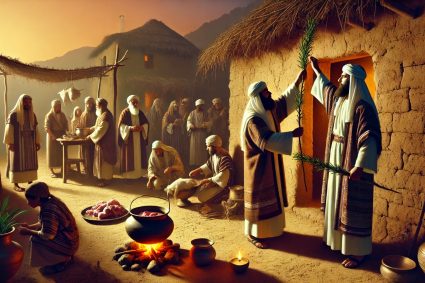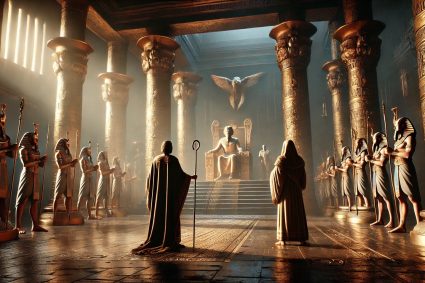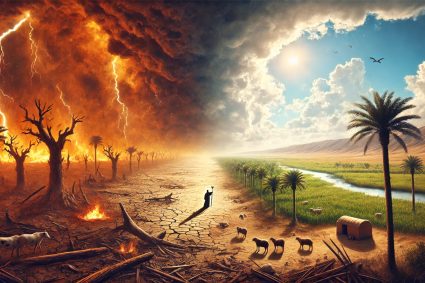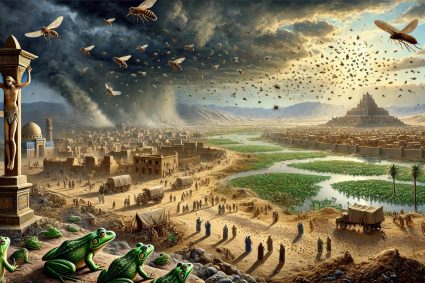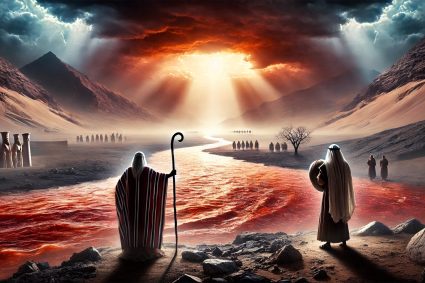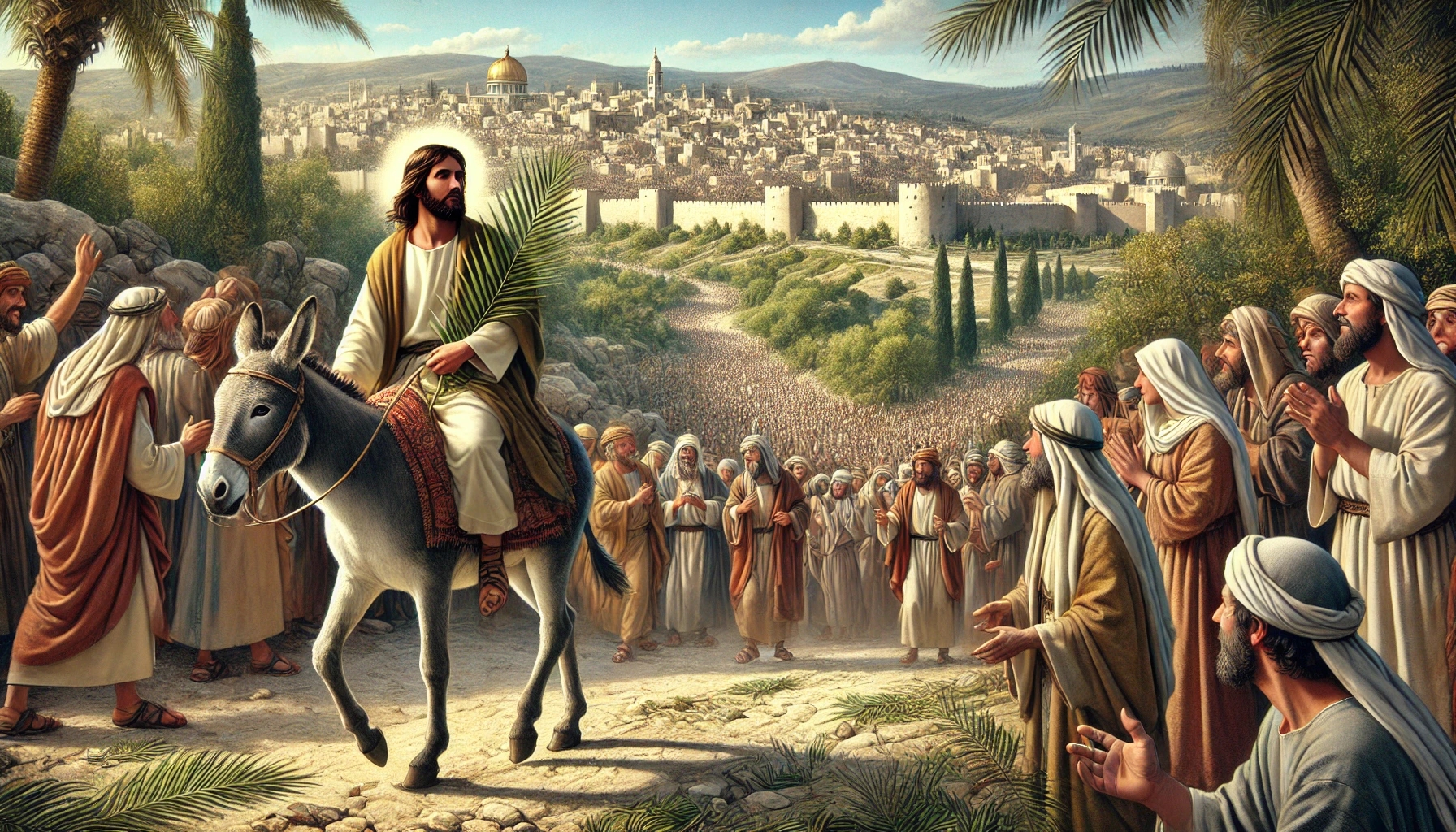
September 7, 2024
DAILY BIBLE READING – Mark Chapter 11
1 And when they came nigh to Jerusalem, unto Bethphage and Bethany, at the mount of Olives, he sendeth forth two of his disciples,
2 And saith unto them, Go your way into the village over against you: and as soon as ye be entered into it, ye shall find a colt tied, whereon never man sat; loose him, and bring him.
3 And if any man say unto you, Why do ye this? say ye that the Lord hath need of him; and straightway he will send him hither.
4 And they went their way, and found the colt tied by the door without in a place where two ways met; and they loose him.
5 And certain of them that stood there said unto them, What do ye, loosing the colt?
6 And they said unto them even as Jesus had commanded: and they let them go.
7 And they brought the colt to Jesus, and cast their garments on him; and he sat upon him.
8 And many spread their garments in the way: and others cut down branches off the trees, and strawed them in the way.
9 And they that went before, and they that followed, cried, saying, Hosanna; Blessed is he that cometh in the name of the Lord:
10 Blessed be the kingdom of our father David, that cometh in the name of the Lord: Hosanna in the highest.
11 And Jesus entered into Jerusalem, and into the temple: and when he had looked round about upon all things, and now the eventide was come, he went out unto Bethany with the twelve.
12 And on the morrow, when they were come from Bethany, he was hungry:
13 And seeing a fig tree afar off having leaves, he came, if haply he might find any thing thereon: and when he came to it, he found nothing but leaves; for the time of figs was not yet.
14 And Jesus answered and said unto it, No man eat fruit of thee hereafter for ever. And his disciples heard it.
15 And they come to Jerusalem: and Jesus went into the temple, and began to cast out them that sold and bought in the temple, and overthrew the tables of the moneychangers, and the seats of them that sold doves;
16 And would not suffer that any man should carry any vessel through the temple.
17 And he taught, saying unto them, Is it not written, My house shall be called of all nations the house of prayer? but ye have made it a den of thieves.
18 And the scribes and chief priests heard it, and sought how they might destroy him: for they feared him, because all the people was astonished at his doctrine.
19 And when even was come, he went out of the city.
20 And in the morning, as they passed by, they saw the fig tree dried up from the roots.
21 And Peter calling to remembrance saith unto him, Master, behold, the fig tree which thou cursedst is withered away.
22 And Jesus answering saith unto them, Have faith in God.
23 For verily I say unto you, That whosoever shall say unto this mountain, Be thou removed, and be thou cast into the sea; and shall not doubt in his heart, but shall believe that those things which he saith shall come to pass; he shall have whatsoever he saith.
24 Therefore I say unto you, What things soever ye desire, when ye pray, believe that ye receive them, and ye shall have them.
25 And when ye stand praying, forgive, if ye have ought against any: that your Father also which is in heaven may forgive you your trespasses.
26 But if ye do not forgive, neither will your Father which is in heaven forgive your trespasses.
27 And they come again to Jerusalem: and as he was walking in the temple, there come to him the chief priests, and the scribes, and the elders,
28 And say unto him, By what authority doest thou these things? and who gave thee this authority to do these things?
29 And Jesus answered and said unto them, I will also ask of you one question, and answer me, and I will tell you by what authority I do these things.
30 The baptism of John, was it from heaven, or of men? answer me.
31 And they reasoned with themselves, saying, If we shall say, From heaven; he will say, Why then did ye not believe him?
32 But if we shall say, Of men; they feared the people: for all men counted John, that he was a prophet indeed.
33 And they answered and said unto Jesus, We cannot tell. And Jesus answering saith unto them, Neither do I tell you by what authority I do these things.
King James Version. Public Domain
Commentary
Introduction:
Mark 11 describes key events in Jesus’ life that point to his ultimate confrontation with religious leaders and the fulfillment of his messianic mission. The text begins with Jesus’ triumphant entry into Jerusalem, continues with the cleansing of the temple, and concludes with discussions about his authority. These events highlight the tension between Jesus and the religious authorities and reveal profound spiritual teachings about faith, prayer, and forgiveness.
Commentary:
Jesus’ entry into Jerusalem is traditionally interpreted as a sign of his messianic identity. By riding on a colt, Jesus fulfills the Old Testament prophecy from Zechariah 9:9, which describes the gentle king coming on a donkey. The crowds welcoming him with “Hosanna” and spreading their cloaks and branches before him recognize him as the promised savior, although they might have had different expectations about the nature of his reign.
The cleansing of the temple, where Jesus drives out the sellers and money changers from the sacred area, demonstrates his zeal for the purity of worship. The temple, which was meant to be a house of prayer for all nations, had become a place of profit. This act provokes the religious leaders, who feel increasingly threatened.
The withered fig tree miracle symbolizes judgment on Israel, which was outwardly religious but inwardly fruitless. Jesus uses this opportunity to instruct his disciples about faith: true faith is powerful and produces visible results. The theme of forgiveness is also emphasized—without forgiveness, prayer cannot be effective.
The final confrontation with the religious leaders shows how much Jesus challenges them. They question his authority, but through his counter-question, he cleverly evades their trap while simultaneously exposing their hypocrisy.
Summary:
Mark 11 portrays the events surrounding Jesus’ triumphant entry into Jerusalem, the cleansing of the temple, and the symbolic withering of the fig tree. Jesus reveals his messianic identity and challenges the religious leaders by questioning the state of the temple and the faith of Israel. His teachings emphasize the importance of faith, prayer, and forgiveness, while the tension with religious authorities escalates. These chapters set the stage for the forthcoming dramatic events in Jesus’ life.
![]()

WEEKLY SPIRIT OF PROPHECY READING – Ellen White | The Desire of Ages
Chapter 59—Priestly Plottings
This chapter is based on John 11:47-54.
Read online here
Commentary
Introduction:
Chapter 59 addresses the dramatic events surrounding the resurrection of Lazarus and their immediate impact on Jesus’ life and ministry. This episode, based on John 11:47-54, highlights the growing hostility of the Jewish priests and leaders toward Jesus, culminating in a determined conspiracy to kill him. The chapter illustrates how a miracle that revealed God’s power and grace not only led many hearts to faith but also intensified the hatred and rejection of Jesus by the religious authorities.
Commentary:
The resurrection of Lazarus marks a turning point in the relationship between Jesus and the Jewish religious leaders. This miracle, which undeniably testified to Jesus’ divine nature, pushed the priests and Pharisees to the brink of their patience. They were no longer merely distrustful or skeptical; they saw their power and influence seriously threatened. Particularly noteworthy is the role of the high priest Caiaphas, whose words—”It is better for you that one man die for the people than that the whole nation perish”—carry a prophetic irony. Caiaphas speaks these words out of political calculation to secure his own position, yet in reality, he unknowingly fulfills the divine prophecy about Jesus’ sacrifice for humanity.
This chapter reveals the tragedy of the blindness in which the religious leaders found themselves. Despite the clear signs and miracles that Jesus performed, they closed themselves off from the truth, seeing him only as a threat to their power and traditions. Their decision to kill Jesus was less a rational choice and more the result of pride, fear, and spiritual blindness. Instead of accepting the light revealed to them in Jesus Christ, they chose the path of darkness, which ultimately led to their own downfall.
Summary:
Chapter 59 describes the immediate reaction of the Jewish priests and leaders to the miracle of Lazarus’ resurrection. While many witnesses of this miracle were led to faith in Jesus, the priests’ hatred of him grew stronger. Pharisees and Sadducees, who had previously been divided in their stance toward Jesus, now united in their resolve to kill him. The high priest Caiaphas argued that it was better to sacrifice one man to save the nation, unknowingly affirming Jesus’ divine mission. The religious leaders, entangled in their intrigues, rejected Jesus’ divine nature and decided to kill him to secure their own power. However, Jesus, aware of his enemies’ plans, withdrew to avoid hastening the time of his ultimate sacrifice. The chapter concludes with the realization that the world could only endure the presence of its Savior for a short time, despite his life being marked by selfless service and suffering for humanity.

WEEKLY SPIRIT OF PROPHECY READING – Ellen White | The Desire of Ages
Chapter 60—The Law of the New Kingdom
This chapter is based on Matthew 20:20-28; Mark 10:32-45; Luke 18:31-34.
Read online here
Commentary
Introduction:
Chapter 60 highlights the deep spiritual lessons that Jesus taught his disciples on the way to Jerusalem, just before he experienced his suffering and death. In this section, Jesus prepares his disciples for the upcoming events and reveals to them the law of his new kingdom, which fundamentally differs from worldly kingdoms. Instead of seeking power and dominion, Jesus calls his followers to humbly serve and sacrifice themselves for others, thereby attaining true greatness in the kingdom of God.
Commentary:
This chapter offers a powerful reflection on the contrasts between worldly notions of power and the spiritual ideal of service in the kingdom of God. Jesus corrects the ambitions of his disciples, who are still influenced by earthly ideas of a messianic kingdom, by revealing to them the true nature of his reign. His response to John and James, who request privileged places in his kingdom, demonstrates that true greatness in the kingdom of God is not achieved through positions or titles, but through self-sacrifice and service to others.
The teachings Jesus imparts in this chapter are radical and challenge the prevailing societal understanding of power and authority. In a world where rank and influence are often exercised through oppression and control, Jesus shows that true authority lies in the willingness to serve others, even at the cost of one’s own life. This teaching not only shapes the disciples but also forms the foundation of Christian ethics, as practiced in the early Christian communities.
Jesus’ words remind us that the pursuit of power and influence in the worldly sense has nothing to do with the nature of his kingdom. Instead, it is humility, service, and sacrifice that matter in the kingdom of God. This is embodied in the life and death of Jesus himself, who paid the ultimate price to redeem humanity.
Summary:
Chapter 60 describes how, on the way to Jerusalem, Jesus prepares his disciples for his impending suffering and the true character of his kingdom. Despite their hopes for earthly power and honor, Jesus teaches them that true greatness in the kingdom of God is achieved through humility, service, and self-sacrifice. John and James, who seek places of honor in his kingdom, are reminded that such positions are not attained through personal ambition but through suffering and bearing the cross. In a world characterized by power and control, Jesus shows that the principles of his kingdom are based on love and selflessness. These teachings not only shape the disciples but also the early Christian community, which is characterized by a spirit of unity and mutual love.
(Visited 10 times, 1 visits today)

